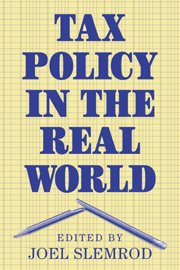Book contents
- Frontmatter
- Contents
- List of contributors
- 1 The real world of tax policy
- 2 Federal tax reform
- The corporate income tax: economic issues and policy options
- Changing views of the corporate income tax
- The American retail sales tax: considerations on their structure, operations, and potential as a foundation for a federal sales tax
- Would tax evasion and tax avoidance undermine a national retail sales tax?
- Life under a personal consumption tax: some thoughts on working, saving and consuming in Nunn-Domenici's tax world
- Living with the flat tax
- The international implications of consumption tax proposals
- 3 Federalism and subfederal taxes
- 4 Principles, politics, and the professors
- Index
The corporate income tax: economic issues and policy options
Published online by Cambridge University Press: 01 June 2010
- Frontmatter
- Contents
- List of contributors
- 1 The real world of tax policy
- 2 Federal tax reform
- The corporate income tax: economic issues and policy options
- Changing views of the corporate income tax
- The American retail sales tax: considerations on their structure, operations, and potential as a foundation for a federal sales tax
- Would tax evasion and tax avoidance undermine a national retail sales tax?
- Life under a personal consumption tax: some thoughts on working, saving and consuming in Nunn-Domenici's tax world
- Living with the flat tax
- The international implications of consumption tax proposals
- 3 Federalism and subfederal taxes
- 4 Principles, politics, and the professors
- Index
Summary
The United States still relies, although less heavily than it did in the past, on revenues from the corporate income tax. While the tax is currently a distant third in share of federal revenues, trailing both the individual income tax and the payroll tax, it was much more important in the past. The corporate tax's decline as a share of federal revenues results from both the growth of other revenue sources and the decline of the corporate tax as a percent of GNP. This latter effect, in turn, arises from both a decline in corporate profits as a share of output and a decline in effective corporate tax burdens.
A separate corporate tax has been justified at various times by the special privileges the corporation receives (in terms of limited liability), the independent economic power obtained by large corporations, and the need to tax corporations in order to prevent the sheltering of income by high-income individuals given the complexities of partnership taxation. The corporation is a popular target for raising revenue, since it is not very visible. Finally, if one expects the tax to be paid by owners of capital, the tax may contribute to a more progressive overall federal tax system, an outcome that is desirable in some quarters.
Many of these arguments for retaining the separate corporate tax would be viewed with skepticism by most economists. Indeed, it has been primarily economists who have been the most critical of the corporate income tax, citing its creation of a variety of distortions.
- Type
- Chapter
- Information
- Tax Policy in the Real World , pp. 15 - 26Publisher: Cambridge University PressPrint publication year: 1999



